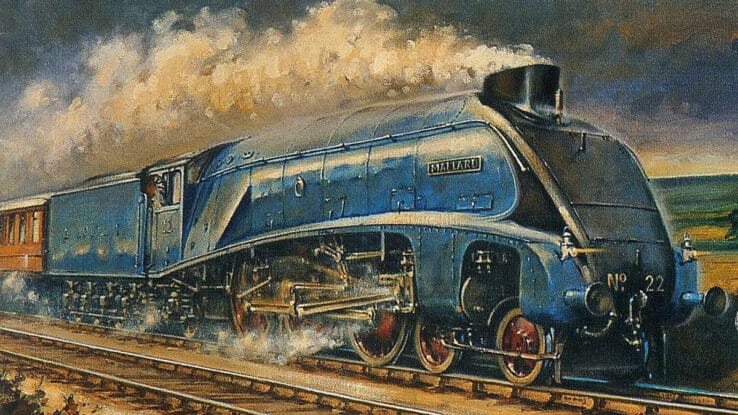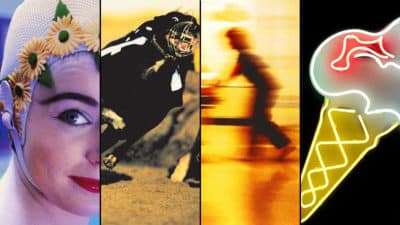Music

Looking Back
Blur: Modern Life Is Rubbish turns 30
Thirty years on from the album that helped shape Britpop, here’s why you need to lace up your adidas Sambas and jump right back in…
It might seem that Damon Albarn is all but untouchable, but back in the early 90s, he and the rest of Blur – bassist Alex James, guitarist Graham Coxon, and drummer Dave Rowntree – were facing something of an identity crisis.
Accused of jumping on the post-Madchester bandwagon by music critics, and at risk of being dropped by their label after a slew of catastrophic live performances, Blur were devolving. Despite their 1991 debut Leisure being a commercial success, it seemed there was no place in the 90s for these bowl-cut Londoners and their ‘baggy’ shoegaze sound. A disastrous 1992 tour of the United States only heightened this state of musical limbo. Grunge was belting out f*ck-yeah singles and dominating the American airwaves, which left very little room for Blur’s quirky English aesthetic on Stateside stages. Worn out and disenchanted, the band returned home to find Suede had become the new darlings of Britain’s notoriously fickle music press. It seemed a new direction was needed, and fast.
Arguably, it’s a combination of all these factors that brought Modern Life Is Rubbish to the fore. Suffering from homesickness while touring the US, Albarn apparently found solace in the lyrics of Ray Davies from The Kinks, a sound that celebrated everything he and the band loved about England, and what they missed about it.
What happened next was the start of something huge. Like, massive. As in, the makings of a brand-new genre that would go on to reformulate Britain’s entire musical consciousness.
Recorded in London’s Crouch End and produced by Steven Street – who had also worked with the likes of The Smiths and The Cranberries – and released in May of 1993, Modern Life Is Rubbish became an ode to the eccentricities of Great Britain. Its quirks and its kinks (or Kinks) pushed out alongside a fresh take on the celebrated trad UK guitar sound pioneered by the likes of The Jam and The Small Faces. Together with sweeping orchestral melodies and harmonic backing albums, this album felt bigger and more opulent than the cosmic catchiness of Leisure.
Modern Life Is Rubbish also allowed Albarn to explore themes of Britishness through funny, Davies-style lyrics, offering up a tongue-in-cheek commentary on everything from peeping toms to making a brew. This social observation, in all its glorious cul-de-sac mundane muckiness, was to become Blur’s MO. Park joggers, pigeon-feeders, city dwellers with a penchant for herbal baths: these perfectly imperfect characters wouldn’t have been born without MLIR.
Opening track and lead single ‘For Tomorrow’ is a perfect example of this. Featuring climactic strings and a stomping bassline, the rousing chorus does nothing to detract from the bittersweet lyrics: “London ice cracks on a seamless line. He’s hanging on for dear life. And so we hold each other tightly, and hold on for tomorrow”.
There’s the fatal realisation in this song that tomorrow might come before you’re ready. That life could end before the kettle has even boiled, while The Word plays on TV and London thumps around you like a nightclub with its house lights turned up. Blur were asking us to take a look at modern life and ask ourselves, is this rubbish?
More specific characters are given stage-time in songs such as ‘Colin Zeal’ (“Colin Zeal knows the value of mass appeal. He’s a pedestrian walker, he’s a civil talker. He’s an affable man with a plausible plan”). And then later on ‘Chemical World’: “The pay-me girl has had enough of the bleeps, so she takes the bus into the country. Although she got herself rosy cheeks, she didn’t leave enough money to pay the rent.” Both give off an air of middling and muddling along in 90s Britain – a vibe Albarn rode right through to 1994’s Parklife and 1995’s The Great Escape.
Modern Life Is Rubbish also allowed Graham Coxon and Alex James to dig deep and really hone their individual styles. Dreamy shoegazy stylings are replaced with chunky rhythmic basslines and scuzzy guitars that give the entire album a sense of unpredictability, from the punky plinky ‘Advert’ to the psych-melodic trappings of ‘Oily Water.’ Last song on the album ‘Resigned’ sounds so much like a Blur track it’s like it’s been crafted from the entire band’s DNA after being trapped in amber. The drum licks. Albarn’s hum-like timbre. The ‘Commercial Break’. It’s Blur before Blur were ever properly Blur.
Unsurprisingly, Modern Life Is Rubbish is now widely regarded as one of the albums that paved the way for Britpop. While not as chart-toppingly commercial as its later siblings – it peaked at No.15 in the UK album chart – it allowed Blur to shed their skin and be reborn as one of the UK’s most revered and respected bands, a far cry from the four London lads that tried to bring their own slice of 90s baggy Britishness to grunge fans across the pond over three decades ago. Thankfully, we have this album to remind us that sometimes starting from scratch is all it takes to redefine the musical landscape for an entire generation. That, and a pair of grubby adidas Sambas…









